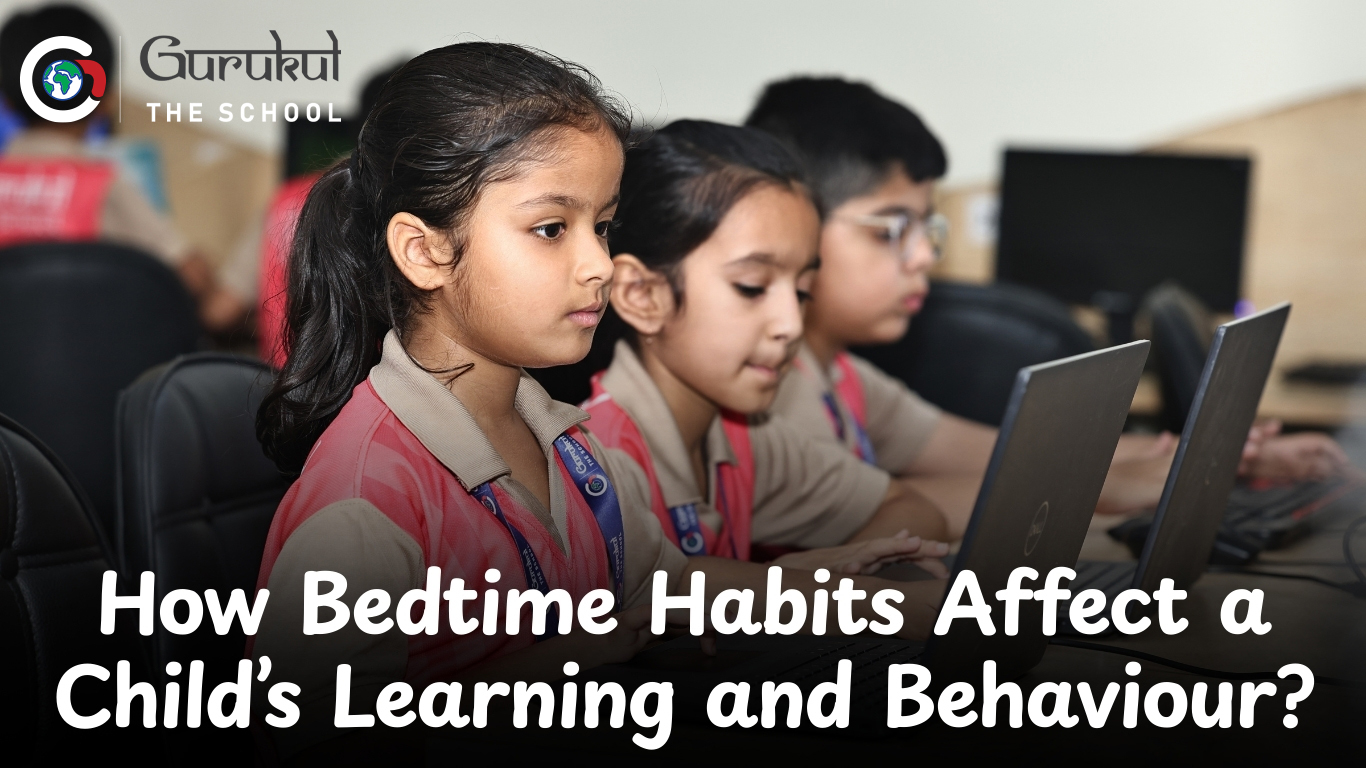How Bedtime Habits Affect a Child’s Learning and Behaviour?
posted on Aug 06, 2025
Gurukul The School, a well-known top schools in Ghaziabad, have always told parents that their kids’ bedtime habits shape far more than just whether they get enough sleep.

If you’re a parent, you’ve likely witnessed one of two situations: your kids waking up enthusiastically and navigating their day with relative ease, or your kids waking up groggy and every activity of their day becomes an uphill battle. The difference between these two scenarios often lies not in what happened that morning, but in what occurred the night before.
We at Gurukul The School, a well-known top schools in Ghaziabad, have always told parents that their kids’ bedtime habits shape far more than just whether they get enough sleep. Their bedtime habits work as the foundation for how effectively children learn to process emotions and behave throughout the following day. So, basically, when we talk about bedtime habits, it isn’t merely about achieving perfect bedtime routines but about understanding the powerful connection between one’s sleep routine and daytime success.
If you want to understand how your child’s bedtime routine is impacting their overall learning experiences and behaviour, then read the full blog post below.
-
Sleep Quality Directly Impacts Memory Formation
As your kids lie on their beds for a good night’s sleep, their brains still remain active. Instead of sleeping, their brain gets busy organising and storing everything they learned during the day. As kids enter deep sleep phases, their brain begins transferring information from their short-term memory to long-term memory so that the information can be easily accessed later.
Hence, we recommend that you, as parents, help your kids maintain consistent bedtime routines so that they can reach deep sleep phases more easily. If bedtimes are irregular or rushed, this natural memory consolidation process gets disrupted. For instance, if your child learned spellings today, they may forget the same really soon if they don’t get a good night’s sleep and have a consistent sleep routine.
Well-rested children always retain classroom lessons more effectively because they’re giving their brains enough time and conditions to process and solidify what they’ve learned.
-
Bedtime Routines Shape Emotional Regulation Throughout the Day
If you start observing your child’s bedtime habits and their behaviour the next day, you’ll find an interesting connection. Calming and structured bedtime routines create emotional security for kids, so they’re able to handle daytime challenges with greater composure.
On the other hand, chaotic or stressful bedtime habits make children carry the same emotional turbulence into the following day. Kids with such bedtime habits often experience more meltdowns and intense reactions to even the smallest of inconveniences.
We at Gurukul The School believe that what appears as defiant behaviour might actually be a child whose emotional resources have been depleted by poor sleep. So, the next time you see your child overreacting to mismatched socks or refusing to eat their breakfast, remember that such behaviour might be connected to their last night’s bedtime routine.
-
Screen Time Before Bed Disrupts Attention and Focus
Parents should be cautious if their kids use smartphones or any devices till the time they fall asleep. The blue light emitted by such devices often interferes with children’s natural melatonin production, which is basically the hormone responsible for making people feel sleepy.
So, what happens is that when kids use devices around their bedtime, their brain gets into ‘alert mode’ instead of preparing for restorative sleep. This leads to a disruptive sleep cycle where poor sleep quality leads to attention difficulties the next day. As a result, a lot of fidgeting and restlessness could be noticed in children the next day.
Such kids also struggle to settle into learning activities and have difficulty maintaining attention during lectures or when teachers are giving instructions, which ends up hampering their academic life really badly.
-
Rushed Bedtime Leads to Daytime Anxiety and Behavioural Issues
Not many know, but if your child’s bedtime is accompanied by rushing, arguing, and stress, they’ll fall asleep in a heightened emotional state. This leads to the production of stress hormones, which not only interfere with their sleep quality but will also be carried into the next day.
This means if your child sleeps in a stressed state, they are more likely to wake up carrying residual tension. This will again impact their confidence, and they will show less willingness to approach new situations or challenges. In most such cases, children tend to display more clinginess and often resist trying new activities. The only solution to such problems is creating calm transitions to sleep by setting healthy bedtime habits.
Conclusion
Whether it’s a kid or an adult, we believe everyone requires a good night’s sleep to rejuvenate and prepare themselves for the next day. When kids are stripped of this basic requirement, you can notice its impact on their learning experiences and overall behaviour. If you want your kids to remain in good mental and physical health to navigate their learning journey effortlessly, then you must prioritise improving their bedtime habits.
We are not asking you to make any massive transformation overnight. Just start with small yet consistent steps that help kids improve their bedtime routine. If you’re unsure how to approach this, we would like to recommend starting by prioritising consistency, ensuring adequate sleep time, and creating peaceful transitions to sleep.
After all, a child’s growth is not only about academics but also about building the right lifestyle practices that support their overall development and health. At Gurukul The School, a highly trusted best school in Ghaziabad, we believe bedtime habits play a very crucial role here. By simply helping your child adopt a healthy sleep routine, you not only help ensure they are properly rested but also give them the focus, resilience, and balance they need the most to thrive in life.